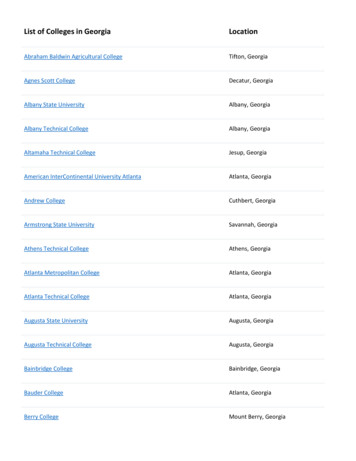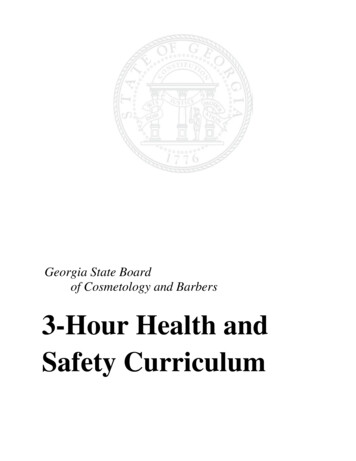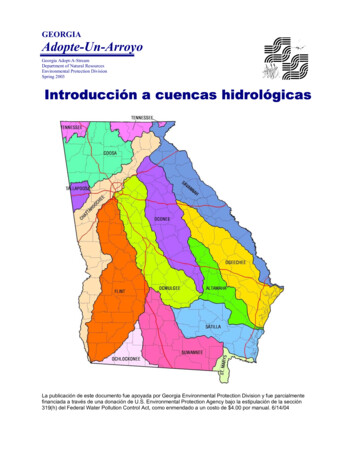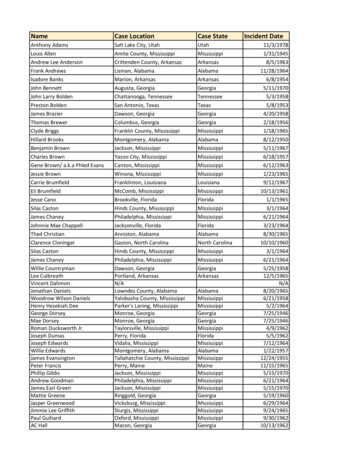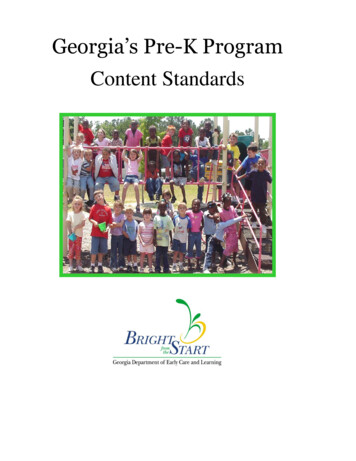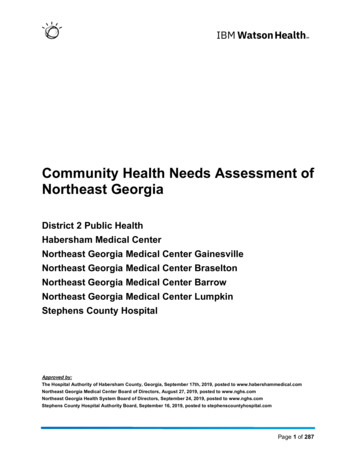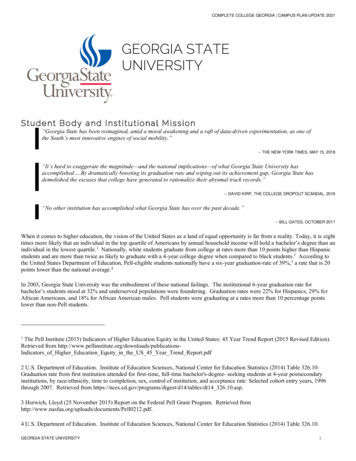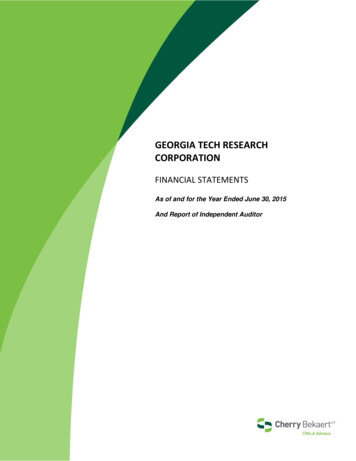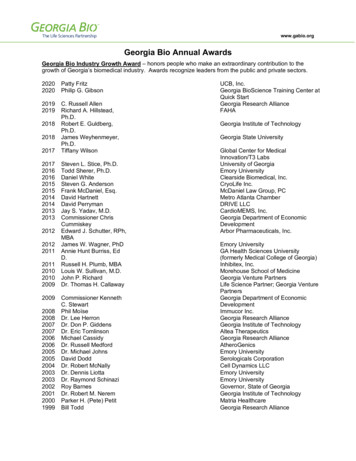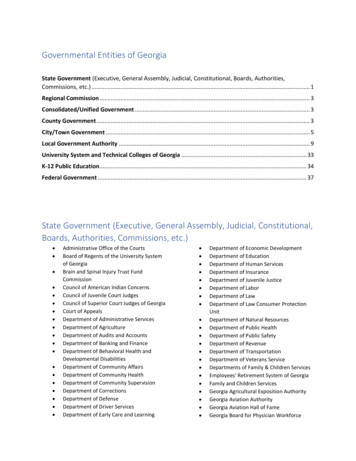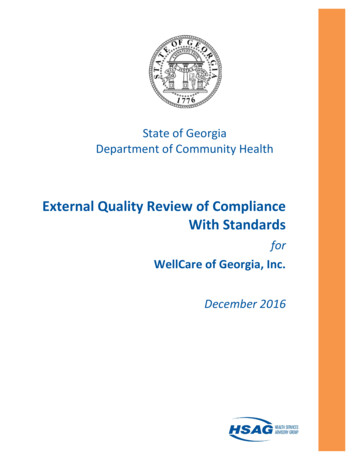
Transcription
State of GeorgiaDepartment of Community HealthExternal Quality Review of ComplianceWith StandardsforWellCare of Georgia, Inc.December 2016
Table of Contents1. Overview . 1-1Background . 1-1Description of the External Quality Review of Compliance with Standards . 1-12. Performance Strengths and Areas Requiring Corrective Action . 2-1Summary of Overall Strengths and Areas Requiring Corrective Action. 2-1Standard I—Clinical Practice Guidelines . 2-2Performance Strengths . 2-2Areas Requiring Corrective Action . 2-2Standard II—Quality Assessment and Performance Improvement . 2-2Performance Strengths . 2-2Areas Requiring Corrective Action . 2-3Standard III—Health Information Systems . 2-5Performance Strengths . 2-5Areas Requiring Corrective Action . 2-5Follow-Up Reviews From Previous Noncompliant Review Findings . 2-6Performance Strengths . 2-6Areas Requiring Corrective Action . 2-63. Corrective Action Plan Process . 3-1Appendix A. Review of the Standards . A-iAppendix B. Follow-Up Review Tool.B-iAppendix C. On-Site Review Participants . C-1Appendix D. Review Methodology . D-1Appendix E. Corrective Action Plan.E-iWellCare of Georgia, Inc. External Quality Review of Compliance With StandardsState of GeorgiaPage iWellCare GA2016-17 EQR Comp Standards F1 1216
1. OverviewBackgroundThe Georgia Department of Community Health (DCH) is responsible for administering the Medicaidprogram and the Children’s Health Insurance Program (CHIP) in the State of Georgia. The State refersto its CHIP program as PeachCare for Kids . Both programs include fee-for-service and managed carecomponents. The DCH contracts with three privately owned managed care organizations, referred to bythe State as care management organizations (CMOs), to deliver services to members who are enrolled inthe State’s Medicaid and CHIP programs. Children in state custody, children receiving adoptionassistance, and certain children in the juvenile justice system are enrolled in the Georgia Families 360 (GF 360 ) managed care program. The Georgia Families (GF) program serves all other Medicaid andCHIP managed care members not enrolled in the GF 360o program. Approximately 1.3 millionbeneficiaries are enrolled in the GF program.1-1According to federal requirements located within the Code of Federal Regulations (CFR), 42 CFR§438.358, the state, an agent that is not a Medicaid MCO, or its external quality review organization(EQRO) must conduct a review to determine a Medicaid MCO’s compliance with standards establishedby the state related to member rights and protections, access to services, structure and operations,measurement and improvement, and grievance system standards. These standards must be at least asstringent as the federal Medicaid managed care standards described in 42 CFR §438—Managed Care.To comply with the federal requirements, DCH contracted with Health Services Advisory Group, Inc.(HSAG), as its EQRO to conduct compliance reviews of the Georgia Families CMOs. The DCH usesHSAG to review one-third of the full set of standards each year over a three-year cycle.Description of the External Quality Review of Compliance with StandardsThe DCH requires its CMOs to undergo annual compliance reviews that cover a third of the federalstandards each year. This ensures that within a three-year period, a full comprehensive assessment isconducted to meet federal requirements. The review presented in this report covered the period of July 1,2015–June 30, 2016, and marked the third year of the current three-year cycle of external quality reviews.HSAG performed a desk review of WellCare of Georgia, Inc.’s (WellCare’s) documents and an on-sitereview that included reviewing additional documents, conducting interviews with key WellCare staffmembers, and conducting file reviews. HSAG evaluated the degree to which WellCare complied withfederal Medicaid managed care regulations and the associated DCH contract requirements in threeperformance categories. All three review areas included requirements associated with federal Medicaidmanaged care structure and operation standards found at 42 CFR §438.236–§438.240, and §438.242. A1-1Georgia Department of Community Health. “Georgia Families Monthly Adjustment Summary Report, Report Period:12/2015.”WellCare of Georgia, Inc. External Quality Review of Compliance With StandardsState of GeorgiaPage 1-1WellCare GA2016-17 EQR Comp Standards F1 1216
OVERVIEWfourth performance category focused specifically on noncompliant standards from the prior reviewperiods. The standards HSAG evaluated included requirements that addressed the following areas: Clinical Practice GuidelinesQuality Assessment and Performance Improvement (QAPI)Health Information SystemsRe-review of Not Met elements from the prior years’ reviewFollowing this overview (Section 1), the report includes: Section 2—A summary of HSAG’s findings regarding WellCare’s performance results, strengths,and areas requiring corrective action.Section 3—A description of the process and timeline WellCare will follow for submitting to DCH itscorrective action plan (CAP) addressing each requirement for which HSAG scored WellCare’sperformance as noncompliant.Appendix A—The completed review tool HSAG used to:‒Evaluate WellCare’s compliance with each of the requirements contained within the standards.‒Document its findings, the scores it assigned to WellCare’s performance, and (when applicable)corrective actions required to bring its performance into compliance with the requirements.Appendix B—The completed review tool HSAG used to evaluate WellCare’s performance in eachof the areas identified as noncompliant from the prior year’s review.Appendix C—The dates of the on-site review and a list of HSAG reviewers, DCH observers, and allWellCare staff members who participated in the interviews that HSAG conducted.Appendix D—A description of the methodology HSAG used to conduct the review and to draft itsfindings report.Appendix E—A template for WellCare to use in documenting its CAP for submission to DCHwithin 30 days of receiving the final report.WellCare of Georgia, Inc. External Quality Review of Compliance With StandardsState of GeorgiaPage 1-2WellCare GA2016-17 EQR Comp Standards F1 1216
2. Performance Strengths and Areas Requiring Corrective ActionSummary of Overall Strengths and Areas Requiring Corrective ActionHSAG determined findings for the compliance review from its: Desk review of the documents WellCare submitted to HSAG prior to the on-site review.On-site review of additional documentation provided by WellCare.Interviews of key WellCare administrative and program staff members.File reviews during the on-site review.HSAG assigned a score of Met or Not Met for each of the individual elements it reviewed based on ascoring methodology, which is detailed in Appendix D—Review Methodology. If a requirement was notapplicable to WellCare during the period covered by the review, HSAG used a Not Applicabledesignation. HSAG then calculated a total percentage-of-compliance score for each of the standards and anoverall percentage-of-compliance score across the standards as well as the follow-up review.Table 2-1 presents a summary of WellCare’s performance results.Table 2-1—Standards and Compliance ScoresStandard#Standard Name# ofElements*# ofApplicableElements**#Met#Not Met#NotApplicableTotalComplianceScore***IClinical Practice Guidelines111192081.8%IIQuality Assessment andPerformance Improvement(QAPI)32301614253.3%IIIHealth Information Systems8871087.5%NAFollow-up Reviews FromPrevious NoncompliantReview Findings6651083.3%57553718267.3%Total Compliance Score* Total # of Elements: The total number of elements in each standard.** Total # of Applicable Elements: The total number of elements within each standard minus any elements that received adesignation of NA.*** Total Compliance Score: Elements that were Met were given full value (1 point). The point values were then totaled, andthe sum was divided by the number of applicable elements to derive a percentage score.The remainder of this section provides a high-level summary of WellCare’s performance noted in eachof the areas reviewed. In addition, the summary describes any areas that were not fully compliant withthe requirements and the follow-up corrective actions recommended for WellCare.WellCare of Georgia, Inc. External Quality Review of Compliance With StandardsState of GeorgiaPage 2-1WellCare GA2016-17 EQR Comp Standards F1 1216
PERFORMANCE STRENGTHS AND AREAS REQUIRING CORRECTIVE ACTIONStandard I—Clinical Practice GuidelinesPerformance StrengthsWellCare adopted 41 evidence-based, clinical practice guidelines (CPGs) in the areas of chronic careconditions and preventive and behavioral health. WellCare adopted CPGs in consultation with networkproviders. WellCare included community providers and medical societies in the review and adoption ofCPGs. The CMO made decisions regarding the CPGs through its committee meetings.WellCare implemented processes to consider the needs of its members when identifying CPG topics.Areas Requiring Corrective ActionWellCare had inconsistencies in its methodology for measuring and assessing CPGs as documented inthe policy, the compliance audit tools, and in the Quality Improvement (QI) Program Description.WellCare did not create a distinct linkage between the DCH CPG audit process for monitoring the threemandated CPGs and the compliance tools, or include a consistent description of the DCH CPG auditprocess for measuring and assessing provider compliance in its documents.WellCare did not document how it ensured that decisions made regarding utilization management orcoverage of service were consistent with CPGs. WellCare has not implemented a process to ensure staffdecisions involving utilization management and coverage of services are consistent with the guidelines.Standard II—Quality Assessment and Performance ImprovementPerformance StrengthsDuring the interview session, WellCare described its pilot program for member advocacy. This programincluded the development of a database containing more than 10,000 community organizations andcommunity events that focused on assisting members in the areas of housing, food, jobs, and access tohealthcare services. WellCare’s healthcare advocacy associates provided assistance to members toensure that the basic needs of members and their families were met (e.g., a place to live, the ability topay for utilities), and that they were connected to food and clothing resources. By meeting these basicneeds, WellCare stated that members were then able to focus on meeting their healthcare needs. Thehealthcare advocacy associates’ efforts are showing positive preliminary results. For example, theperformance measure rates for breast cancer screening have improved. WellCare was working with theRobert Wood Johnson Foundation to evaluate the results of the healthcare advocacy associates’ work,which WellCare described as an investment in the health of members and in the Georgia community.WellCare of Georgia, Inc. External Quality Review of Compliance With StandardsState of GeorgiaPage 2-2WellCare GA2016-17 EQR Comp Standards F1 1216
PERFORMANCE STRENGTHS AND AREAS REQUIRING CORRECTIVE ACTIONWellCare expanded the role of its staff members who work with provider practices to improveHealthcare Effectiveness Data and Information Set (HEDIS )2-1 scores to include discussions onoverutilization, underutilization, member care needs, and healthcare advocacy.WellCare used demographic information, as well as various clinical and behavioral health utilizationpatterns, to identify members who might benefit from disease management or case managementprograms. Disease management and case management services were made available to identified at-riskmembers as a result of a review of relevant data.WellCare worked directly with providers and the community on quality improvement initiatives such asuse of telemedicine and access to school-based care. Other quality improvement initiatives focused onimproving the quality of care coordination and care transitions in efforts to reduce gaps in care.WellCare implemented quality improvement processes based on patient safety data and trends. Forexample, WellCare used its peer review process for a substantiated quality of care concern that resultedin the termination of a provider. The CMO stated that the medical director may bring in three specialtynetwork or community providers to review care concerns through the peer review process. Anotherexample discussed how a network monitoring activity identified an opportunity to improve the therapynetwork. The quality improvement activity included gathering more data on referral patterns andimplementing interventions that resulted in an improved therapy network. WellCare implemented aPharmacy Lock-In Report it used to identify opportunities to address overutilization, pharmacy issues,and drug-seeking behaviors, as well as prescribing pattern deviations.WellCare reviewed disease management statistics, clinical quality initiatives, quality of care and qualityof service issues, complaints, grievances and adverse event data, and member and provider satisfactionsurvey results in its committees and work groups, and the CMO recommended strategies to improvecompliance. WellCare initiated performance improvement projects to address trends identified throughmonitoring activities, review of complaints and allegations of abuse, provider satisfaction, andutilization management reviews.WellCare described its use of the Coleman Model for transitions in care in its discharge planning andhow WellCare worked with the developer to allow a hybrid model that reflected the Medicaidpopulation served by the CMO. Another example was the CMO’s use of the Lace Tool for readmissionrisk assessments.Areas Requiring Corrective ActionWellCare must develop a comprehensive QAPI Program Description. The QAPI Program Descriptionmust be developed according to the DCH guidelines. The QAPI Program Description must be approvedby DCH as meeting the DCH guidelines. The documentation submitted by WellCare did not include theQAPI Program Description that is required by DCH. The documentation submitted by the CMOindicated that the CMO had developed and implemented some of the elements required by DCH in the2-1HEDIS is a registered trademark of the National Committee for Quality Assurance (NCQA).WellCare of Georgia, Inc. External Quality Review of Compliance With StandardsState of GeorgiaPage 2-3WellCare GA2016-17 EQR Comp Standards F1 1216
PERFORMANCE STRENGTHS AND AREAS REQUIRING CORRECTIVE ACTIONQAPI Program Description. The CMO must develop and submit as evidence of compliance with theQAPI Standards a QAPI Program Description that is comprehensive and meets the DCH guidelines.The documentation provided by WellCare included information on various activities related to qualityassessment and performance improvement, but the information was not in the format required by DCH.For example, QAPI strengths identified in other documents reviewed indicated that WellCare’s QAPIProgram was enhanced by provider participation and information received from members and theirfamilies and guardians. As an example, WellCare implemented processes and committees to involvemembers, providers, and community organizations in quality improvement. During the compliancereview interviews, WellCare staff discussed examples that included a Health Connections Council andProvider Advisory Board. In addition, the CMO staff members highlighted their work with the medicalsocieties to receive input and feedback prior to implementing an activity or program. This work shouldhave been included in the required QAPI Program Description and should have been tied to goals,objectives, interventions, and activities. WellCare should also have a process to measure outcomesrelated to this work. While WellCare involved members, providers, and community organizations inquality improvement, the CMO did not include this information in the QAPI Program Description.As mentioned earlier, WellCare’s health care advocacy associates worked with members to ensure thatthe basic needs of members and their families were met. This work should have been included in therequired QAPI Program Description and tied to goals, objectives, interventions, and activities. WellCareshould also have a process to measure outcomes related to this work.WellCare must develop a process to better document and show in its QAPI Program Description all ofthe quality improvement processes it has developed and implemented. WellCare should include thecomprehensive quality improvement processes used in its QAPI Program Description. This may includea review of information and data available to the CMO through claims/encounters, grievances andappeals, quality of care cases, care management including disease management, case management andcare coordination, and member and provider input to identify quality improvement opportunities andgaps in care or service delivery. The QAPI Evaluation should provide a complete summary of how thequality improvement goals, objectives, and related initiatives were identified; which data were used inthe selection process; which interventions were considered (and implemented); how the initiatives wereresourced, including specific, assigned individuals and their qualifications; and how the results oroutcomes were measured in order to provide a comprehensive story of the effectiveness of WellCare’sQAPI work.WellCare must document how it monitors and evaluates its own processes for quality management andperformance improvement. WellCare must also update its policies, program descriptions, and/orprogram evaluations to describe how, as a result of data analysis or evaluation, indicatedrecommendations are implemented.WellCare must strengthen its provider profiling activities. Data and information (e.g., trends inutilization, complaints and grievances, prescribing, and member satisfaction) may be opportunities forthe CMO to use provider profile information in its operational, network development, or other activities.The DCH instructed the CMO, as the foundation of its QAPI Program, to focus on the CMO’s members.Focus areas should include identifying member demographics and needs. This work should have beenWellCare of Georgia, Inc. External Quality Review of Compliance With StandardsState of GeorgiaPage 2-4WellCare GA2016-17 EQR Comp Standards F1 1216
PERFORMANCE STRENGTHS AND AREAS REQUIRING CORRECTIVE ACTIONincluded in the required QAPI Program Description and tied to goals, objectives, interventions, andactivities. The CMO should also have a process to measure outcomes related to this work.WellCare must document the methodology and process used for conducting and maintaining providerprofiling in its policies. WellCare must develop provider profiling activities that include informationsuch as tracked and trended data regarding utilization, complaints and grievances, prescribing, andmember satisfaction. The CMO’s implementation or use of provider profiling information must beincluded in the QAPI Program Description to guide decisions in network development.The QM Patient Safety Plan must clearly distinguish between grievances and the grievance process. TheQM Patient Safety Plan was not developed or structured according to DCH guidelines. The QM PatientSafety Plan must be approved by DCH. WellCare used the Georgia Registry of ImmunizationTransactions and Services (GRITS) system to collect additional information related to performancemeasures. WellCare would strengthen its quality improvement processes by developing a process to usedata from the GRITS system to facilitate performance improvement, such as identifying providerreporting and immunization patterns.WellCare did not provide evidence that it used the latest available research in the area of qualityassurance. The CMO must base its QAPI Program on the latest available research in the area of qualityassurance.Standard III—Health Information SystemsPerformance StrengthsWellCare used an integrated application suite to support its Medicaid line of business. The healthinformation system, or core processing system (CPS), was based on the Dell Services Xcelys platform.WellCare’s system allowed for a seamless integration with other applications and supported all member,provider, benefit, and claims processing applications. The Enterprise Medical Management Application(EMMA) supported case management, utilization management, disease management, and carecoordination processes. WellCare’s Quality Reporting System used McKesson’s CareEnhance ResourceManagement Software (CRMS), which centralized claims, membership, medical record, and othernarrative information for HEDIS reporting. WellCare managed reporting functions through theEnterprise Data Warehouse.Areas Requiring Corrective ActionWellCare did not provide evidence that it had processes to review data received from providers to ensurethat the data were complete, logical, and consistent with those services provided to the member.WellCare must update its process descriptions to detail how the CMO ensures that data received fromproviders are complete, logical, and consistent.WellCare of Georgia, Inc. External Quality Review of Compliance With StandardsState of GeorgiaPage 2-5WellCare GA2016-17 EQR Comp Standards F1 1216
PERFORMANCE STRENGTHS AND AREAS REQUIRING CORRECTIVE ACTIONFollow-Up Reviews From Previous Noncompliant Review FindingsPerformance StrengthsWellCare abandoned its pilot program to use Southwest Georgia Health Care, Inc.’s, after-hours linebecause there was a barrier to ensuring continuity of care. Instead, WellCare offered its after-hours nurseadvice line to providers who failed the after-hours audit. The advice line allowed offices in rural areasthat had limited staff or availability for after-hours triage to provide WellCare members access to a nurseto determine if the member needed to seek care immediately or if the member should call his or herprimary care provider (PCP) the next day for an appointment.WellCare’s data indicated that it met the timely after-hours return call time frames for nonurgent andurgent calls. Timely access reports submitted by WellCare indicated that in first quarter 2016, afterhours urgent return calls were received within the required time frame 96 percent of the time. Afterhours nonurgent return calls were received within the required time frame 91 percent of the time. InQuarter 4 2015, the reports indicated that after-hours urgent return calls were received within therequired time frame 99 percent of the time and after hours nonurgent return calls were received withinthe required time frame 94 percent of the time.Areas Requiring Corrective ActionAlthough WellCare has found a workaround solution to ensure that its members have access to a nurseadvice line if they are patients of a provider who has failed the after-hours audit, the CMO mustcontinue to work with the providers to meet the after-hours line and access to care requirements.WellCare did not consistently meet the geographic access standards for both urban and rural areas forPCPs, specialists, dental subspecialty providers, and pharmacies. WellCare must continue efforts toclose its network adequacy gaps and meet the GeoAccess standards.WellCare of Georgia, Inc. External Quality Review of Compliance With StandardsState of GeorgiaPage 2-6WellCare GA2016-17 EQR Comp Standards F1 1216
3. Corrective Action Plan ProcessWellCare is required to submit to DCH its corrective action plan (CAP) addressing all requirementsreceiving an HSAG finding of Not Met. WellCare must submit its CAP to DCH within 30 calendar daysof receipt of HSAG’s final External Quality Review of Compliance with Standards Report. WellCaremust identify, for each requirement that requires corrective action, the interventions it plans toimplement to achieve compliance with the requirement, including how the CMO will measure theeffectiveness of the intervention, the individuals responsible, and the timelines proposed for completingthe planned activities.The DCH, in consultation with HSAG, will review, and when deemed sufficient, approve WellCare’sCAP to ensure the CAP sufficiently addresses the interventions needed to bring performance intocompliance with the requirements.WellCare of Georgia, Inc. External Quality Review of Compliance With StandardsState of GeorgiaPage 3-1WellCare GA2016-17 EQR Comp Standards F1 1216
Appendix A. Review of the StandardsFollowing this page is the completed review tool that HSAG used to evaluate WellCare’s performanceand to document its findings; the scores it assigned associated with the findings; and, when applicable,corrective actions required to bring WellCare’s performance into full compliance.WellCare of Georgia, Inc. External Quality Review of Compliance With StandardsState of GeorgiaPage A-iWellCare GA2016-17 EQR Comp Standards F1 1216
Appendix A. State of GeorgiaDepartment of Community Health (DCH)External Quality Review of Compliance With StandardsDocumentation Request and Evaluation Formfor WellCare of Georgia, Inc.Note about the Citations: Unless otherwise specified, the federal Medicaid managed care references for the following requirements are thosecontained in 42 CFR §438, which describes requirements applicable to Medicaid Managed Care Organizations (MCOs).Standard I—Clinical Practice GuidelinesEvidence/DocumentationScoreas Submitted by the CMO1. The CMO has a minimum of three practice guidelines. C7QI-026 Provider Clinical Practice Guidelines, p.4Met42CFR438.236(b) Attention-Deficit Hyperactivity DisorderNot MetContract:N/A4.12.7.1 Management of Asthma in Children and Adults Management of Diabetes Mellitus in Adults 18-75 Years ofAgeFindings: WellCare had a Provider Clinical Practice Guideline Policy (CPG Policy). WellCare included a summary of its clinical practiceguidelines (CPGs) in its Quality Improvement (QI) Program Evaluation. WellCare implemented 41 Georgia-specific CPGs in the areas ofchronic care conditions and preventive and behavioral health.Required Actions: None.2. The guidelines:Requirements and References42CFR438.236(b)Contract:4.12.7.1 Contract: 4.12.7.1 a. Are based on the health needs and opportunitiesfor improvement identified as part of the qualityassessment and performance improvement (QAPI)program.MetC7QI-026 Provider Clinical Practice Guidelines p.4Not MetC7QI-026-PR-001 Provider Clinical Practice Guidelines, p.2N/A2015 GA Medicaid QI Program Description, p.5Provider Handbook, p.33-34Attention-Deficit Hyperactivity DisorderManagement of Asthma in Children and AdultsManagement of Diabetes Mellitus in Adults 18-75 Years ofAgeFindings: WellCare documented in its CPG Policy that the CPGs were based on the health needs of the population and opportunities forimprovement were identified as part of the QAPI Program. The Georgia Medicaid QAPI Program Description referenced the development andreview of CPGs related to the health needs of the population served. WellCare described in the compliance review interview session how it useddata to identify the most prevalent diseases/conditions within its population for purposes of CPG selection.Required Actions: None.WellCare of Georgia, Inc. External Quality Review of Compliance With StandardsState of GeorgiaPage A-1WellCare GA2016-17 EQR Comp Standards F1 1216
Appendix A. State of GeorgiaDepartment of Community Health (DCH)External Quality Review of Compliance With StandardsDocumentation Request and Evaluation Formfor WellCare of Georgia, Inc.Standard I—Clinical Practice GuidelinesEvidence/DocumentationScoreas Submitted by the CMOb. Are based on valid and reliable clinical evidenceMet C7QI-026 Provider Clinical Practice Guidelines, p.4or a
WellCare adopted 41 evidence-based, clinical practice guidelines (CPGs) in the areas of chronic care conditions and preventive and behavioral health. WellCare adopted CPGs in consultation with network providers. WellCare included community providers and medical societies in the review and adoption of CPGs.
